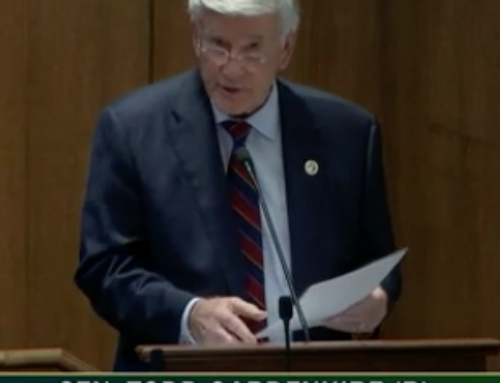The Knox County Commission tonight eliminated a short-lived ban on photography of public records and updated its public records policy to allow citizens to use personal equipment to make their own copies subject to some rules.
Mayor Tim Burchett had requested the change and in a consent vote, commissioners unanimously supported removing the ban.
TCOG has tracked the growing issue of government entities suddenly banning people from snapping photos with their smartphones of public records they are inspecting. This has particularly affected journalists who use phones to take notes and share information.
The Knox County Commission’s action appears to be the first of what we hope will be more reversals on such bans. Many of bans were were adopted by government entities in Tennessee this year as they adopted new public records policies — a process required by law.
The Knox County Commission also updated its policy to add 11 “public records request coordinators” who could handle public records requests. Previously, only one was identified in the policy. The move decentralizes the records requests across government departments (such as the election commission and sheriff’s office) instead of bottlenecking requests through a single office.
It appears the source of bans can be traced to a Model Public Records Policy released in January by the Office of Open Records Counsel that contained language suggesting a government entity decide whether it would or would not allow citizens to use personal equipment to make copies of public records. Many government entities who followed the Model Policy’s language chose to not allow it at all.
The issue came up in a state legislative committee hearing when state Sen. Mike Bell, R-Riceville, urged three state agencies before it that day who had adopted the ban in new policies to end the practice and “allow our citizens to use all the available technology under supervision that is available to them out there — and one of them being able to photocopy a record with a cell phone.”
The agency’s representatives before the committee were surprised by the language, and said they thought they were just following the Open Records Counsel’s model policy. Likewise, Knox County government officials said they had adopted the policy as suggested in the model policy developed by the Open Records Counsel, an office then held by Ann Butterworth.
The resolution approved Monday by Knox County commissioners would remove from the county policy the suggested sentence from the model policy that stated: “A requester will not be allowed to make copies of records with personal equipment” and insert instead:
“A requestor will be allowed to make copies of records with personal equipment, provided that the requestor’s duplication of such records does not impede other citizens’ access to county services or records, and that the requestor is willing to schedule an appointment for the purposes of duplicating a large number of records or records that are stored off-site or are not immediately accessible. However, an independent Knox County officeholder (either elected or appointed) may, in his/her discretion, adopt and enforce reasonable rules governing the use of personal equipment to make copies of records. In all cases, the use of personal storage devices (i.e. external hard drives, flash drives, etc.) or any equipment that must be connected to- or inserted into any County computer, equipment or network is prohibited.”
While the resolution doesn’t promise that no rules will be implemented for people using their own copy equipment, it does make clear that only “reasonable rules” can be adopted, echoing state law.
TCOG, and three other entities who serve on the Advisory Committee on Open Government to advise the Office of Open Records Counsel, have urged Open Records Counsel Lee Pope to update the model policy with different language.
TCOG based its advice on state law that for any record a citizen is allowed to inspect, the citizens “shall have the right to take extracts or make copies thereof, and to make photographs or photostats of the same while such records are in the possession, custody and control of the lawful custodian thereof or such custodian’s authorized deputy…”
While the model language included a suggestion in parenthesis to “(i)ndicate under what circumstances, if any, the Governmental Entity will permit requestors to make their own copies or provide their own storage devices,” few policies examined by TCOG have included any circumstances that photography or self-copying would be allowed.
Several states in the southeast and elsewhere have already addressed this issue, with those states either through attorney general opinions or by another method clarifying that government entities must allow citizens to take photos of public records.
For example, Kentucky, Virginia, Georgia, Maine, Iowa, Florida, Washington, Texas, Arizona and Louisiana are just some states that allow photography and use of personal equipment to make copies of non-exempt public records. If there are restrictions, they are narrow and limited to when there is a credible threat of damage or tearing.



